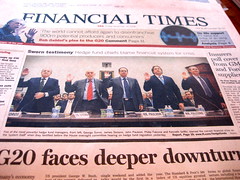Financial Times reviews President Obama’s Infrastructure Spending – Highway to hell revisited
(Source: Financial Times)
“History reminds us,” President Barack Obama told both houses of the US Congress on Tuesday night, “that at every moment of economic upheaval and transformation, this nation has responded with bold action and big ideas.” By “the nation”, Mr Obama means “the government”. We can tell by the episodes he uses to make his point: the establishment of universal public education, the GI Bill of Rights and – alluded to but not named – the Highway Act of 1956, at the time of its passage the largest public works project in US history.
Mr Obama’s praise for the Highway Act is disturbing. In arguments over his stimulus package and his preliminary budget released on Thursday, Republicans have made the lazy assumption that government intervention in the economy can never succeed. Mr Obama shows signs of the opposite error – believing it can never fail.
The Highway Act probably has more defenders than detractors. But Mr Obama should be among the latter. The act, which budgeted $25bn in federal money to build 41,000 miles of motorway, exacerbated the very problems Mr Obama has been most eager to solve – spoliation of the environment, dependence on foreign oil, overburdening of state and local budgets, abandonment of the inner-city poor and reckless speculation in real-estate development, to name a few.
A lot of people complain today about the rump of Republican disbelievers in Keynes, feckless though they may be, who fiddle while Rome burns. There was no hint of such heresy in 1956. The Senate passed the bill 89-1. Otherwise, the political climate bore some resemblance to our own: conformism bred of confusio n. A 40,000 mile highway network had been on the wish list of the armed forces since 1944. Eisenhower was a big backer, and had hopes of justifying it as a stimulus during the recession of 1954. That downturn was long past when the bill came to a vote, but the vested interests remained, and so did the fear that one’s constituents might think it a bit communist to vote against a highway bill.
n. A 40,000 mile highway network had been on the wish list of the armed forces since 1944. Eisenhower was a big backer, and had hopes of justifying it as a stimulus during the recession of 1954. That downturn was long past when the bill came to a vote, but the vested interests remained, and so did the fear that one’s constituents might think it a bit communist to vote against a highway bill.
Click here to read the entire article. (Free registration required at FT.com)
